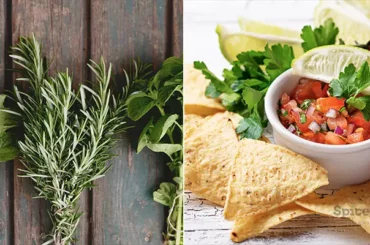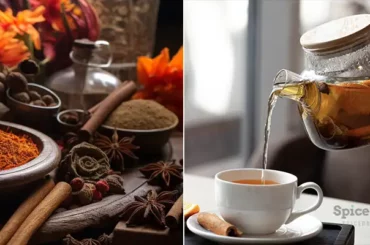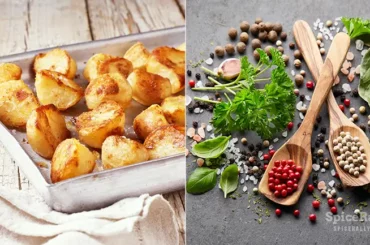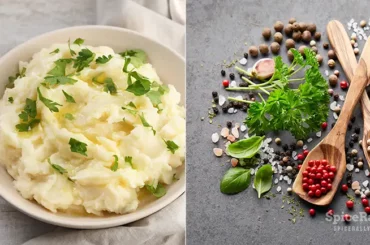Tea, as well known, is the ultimate comfort drink of many people first thing in the morning or after the chores of a hectic day. So, let’s learn how to upgrade this magical drink using the best herbs for tea.
Tea is commonly an aromatic beverage made by infusing fresh or cured leaves of the Camellia sinensis plant. There are many types of tea, including herbal tea infusions, and the best herbs to pair with them include:
- Chamomile
- Peppermint
- Lavender
- Holy basil
- Rosemary
- Lemongrass
- Ashwagandha
Keep reading to learn what we have piled up for you and get an idea to upgrade your next cup of tea!
The Best 07 Herbs For Tea
When we refer to the general term “tea,” it actually can give different first impressions to tea lovers living across different parts of the world. British and Asians would undoubtedly remember a strong cup of black tea, while most others living in places like the USA and outside will think of many other varieties such as green tea, matcha, sencha, oolong, herbal teas, etc.

However, we cannot confine the term tea only to the infusion we commonly make with the leaves of the Camellia sinensis plant since fruit, herb, spice, and floral infusions are also referred to as herbal teas or tisanes. Recently, you’ll be able to find an extensive range of teas infused with different types of ingredients in which herbs play a significant role in them.
Due to the flavor, aroma, and healing properties of these herbs, they are widely incorporated with these infusions and sold commercially as flavorful, healthy beverages. So, in this episode, we will be addressing the best herbs that go well with different types of teas and what benefits you can get by including them in your regular diet.
01- Chamomile
There are two main types of chamomile known as German and Roman chamomile. Out of these two, German chamomile is commonly infused into teas. Most prefer having chamomile tea right before bed, thanks to the amazing sleep-inducing properties it has.
This is one of the most ancient medicinal herbs used with herbal tea infusions, black tea, green tea, white tea, etc. Chamomile has a very mild, pleasant flavor profile with earthy, mellow, apple, and honey-like taste and aroma notes.
This herb is valued for its numerous other health properties, which are well known to treat gastrointestinal disturbances and colic, croup, and fevers in children. Ingredients like citrus, vanilla, ginger, peppermint, and lavender pair well with the flavor and qualities of chamomile.
02- Peppermint
Peppermint is a hybrid species of mint, a cross between spearmint and watermint, which is stronger than regular mint. This is another one of the best herbs for herbal tea infusions, green tea, or black tea.
This herb packs a punch and tastes refreshing with green, minty, cooling, and a sweet candy menthol-like touch. Peppermint tea is typically prized for several incredible health benefits, such as:
- Relieving tension headaches and migraines
- Alleviating digestive issues
- Freshening your breath
- Helping to relieve menstrual cramps
- Boosting energy
- Improving your sleep
This herb is often paired with other ingredients like citrus, cinnamon, berries, chamomile, and lavender to increase its effectiveness and taste.
03- Lavender
Lavender is another popular botanical used widely in tisanes or infused with black and green tea. Its flavor profile is characterized as herbal, floral, and sweet.
Lavender is not a single type of plant but a genus of flowering plants (Lavandula L.) that are found in the mint family, Lamiaceae. Lavender tea improves sleep and skin condition, reduces menstrual discomfort, and has mood-boosting properties.
This herb is usually paired with chamomile, peppermint, rosemary, and most citruses. While lavender leaves are not used in brewing tea, mostly dried lavender flowers do the job perfectly!
04- Holy Basil
Popularly known as Kra Pao in Thailand and Tulsi in India, holy basil is another flavorful, fragrant, and healthy herb used in tea. The leaves, flowers, or dried powder of this herb are included in herbal infusions, black tea, Matcha, or green tea.
You can also make freshly brewed tea by placing 2–3 teaspoons of holy basil leaves in a cup of boiling water and allowing it to steep for 5–6 minutes.
This herb is valued for its important active compounds, which are known to help with respiratory issues, and anxiety, and help alleviate mental stress and digestive problems. Holy basil is paired with saffron, licorice, fennel seeds, rosehips, sage, etc., to make the most out of this herb.
05- Rosemary
This aromatic herb is brewed as the tea itself or incorporated into herbal tea infusions rather than infusing it with any other type of tea. Rosemary has a very unique, bold flavor and aroma with hints of evergreen, mint, lavender, citrus, pine, pepper, pepper, and sage.
This herb is a part of the mint family; thus, it pairs well with peppermint, lavender, a hint of black pepper, sage, etc. Rosemary imparts a strong taste when rosemary is brewed as a tea. Therefore, it would be best to complement its flavor with lemon or lime and a sweetener to balance out a perfect cup of tea.
Fresh rosemary sprigs make a fresh brew, while dried rosemary leaves are incorporated into infusions. This herb is known to be beneficial in lowering high blood pressure, fighting mental fatigue, promoting liver health, improving circulation, etc.
06- Lemongrass
Lemongrass, also called citronella stalky plant with a fresh and bold lemony aroma and a citrus flavor. It is also used as a folk remedy to stimulate sleep, reduce pain, and boost immunity.
Lemongrass is popularly used in Thailand and Sri Lanka in cooking. But other countries take advantage of lemongrass tea as well. This herb is used in tisanes and is sometimes infused with black and green tea.
A soothing beverage is prepared by brewing fresh lemongrass stalks in water and preparing it as a warm or chilled brew. This herb is paired with lemon, lime, mint, ginger, peaches, etc., to enhance the taste and health properties.
07- Ashwagandha
You may or may not have heard about this incredible herb used widely with tea infusions. Ashwagandha (Withania somnifera) is generally known as “Indian Winter cherry” or “Indian Ginseng.” It is one of the most essential herbs of Ayurveda, used for millennia as a tonic for its wide-ranging health benefits.
The tea made from this herb boasts a bold, earthy, and musky flavor. Its distinctive flavor can be mellowed out by adding spices, milk, and fruit infusions. Ashwagandha is often incorporated into fruit and herbal infusions.
The cancer-fighting, blood sugar-controlling, stress-relieving, and fertility-boosting properties of this herb have made it a popular herbal addition to tea. Its assertive flavor is often paired with other wholesome ingredients like turmeric, cardamom, cinnamon, pomegranate, and holy basil to increase its effectiveness as a tisane.
How Do These Herbs In Tea Pair With Other Ingredients?
As you see in each description we have given under each herb, different herbs pair with different ingredients that go with their flavor profile.
And most importantly, the base we use to make that particular tea is a crucial factor for these pairings. For example, when one specific herb is infused with black tea, black tea itself is the main element, and the herb might be paired with some other ingredients to back up the flavor of black tea.
In such instances, the flavor of particular herbs or complementary flavors is never overpowered. Spices are paired the same way with herbs, and you can refer to this article if you like to learn more about the spices that go well with tea.
Concluding With The Best Herbs For Tea
Black, green, white, matcha, oolong, rooibos, herbal teas– all of them make the perfect cup of tea whenever you need to rejuvenate and nourish. Herbs like chamomile, peppermint, lavender, lemongrass, ashwagandha, etc., are great ingredients to complement the refreshing taste of whatever tea you make.
You can make your own tea blend at home or count on a variety of shop-bought options when you need to savor the goodness of herb-infused tea. So, what is your favorite infusion? Let us know in the comments below!




